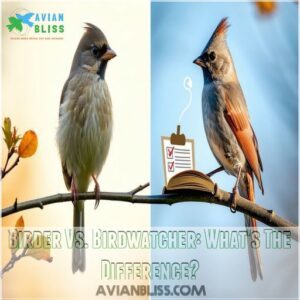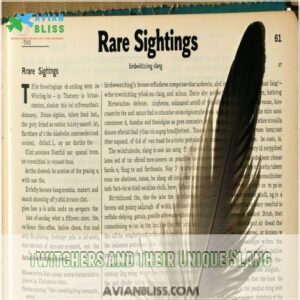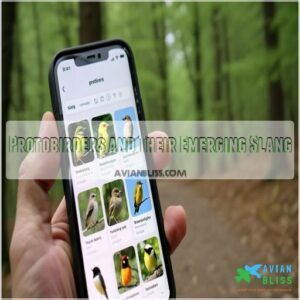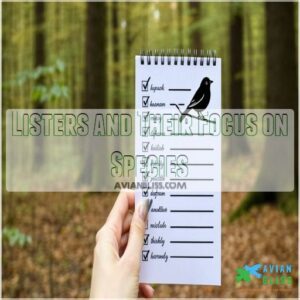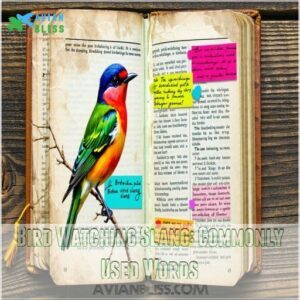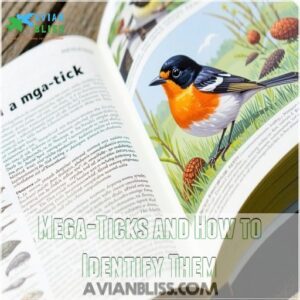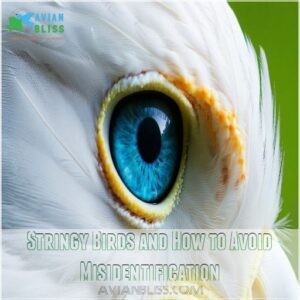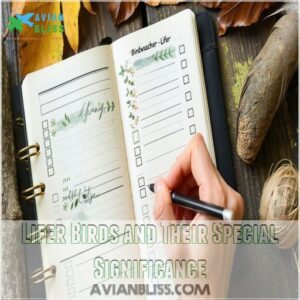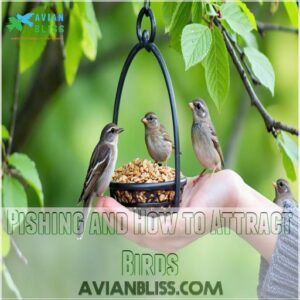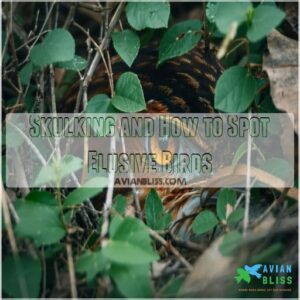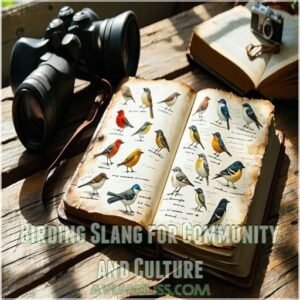This site is supported by our readers. We may earn a commission, at no cost to you, if you purchase through links.
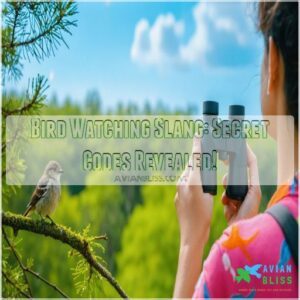
Imagine running into a "twitcher" who’s busy chasing a rare "mega-find" like it’s the birding Olympics.
Maybe you’re new to this, just a "dude" with your "binos" (that’s binoculars for us bird folk), scanning the trees for that first "lifer".
It’s a rush when you finally see it!
And if you’re feeling ambitious, a "Big Year" is your ticket to cramming as many bird sightings as possible into 365 days.
There’s more to learn, so stay tuned for tales of "mega-ticks" and more birding jargon!
Table Of Contents
Key Takeaways
- You’ll find that birdwatching slang like "binos" for binoculars makes the hobby more fun and connects you with fellow birders.
- Embrace terms like "lifer" and "mega-find" to enrich your birding experience and feel like part of a special community.
- Birding slang helps make identification easier and adds humor to your adventures, enhancing your outdoor experience.
- Understanding the difference between casual "birdwatching" and more active "birding" helps you choose your level of engagement and excitement.
Birdwatching Terminology Explained
You’re about to enter the quirky world of birdwatching lingo, where terms like "Big Day" and "Bino" might sound a bit like secret passwords.
Get ready to chuckle as you learn how to talk like a true birder without actually burning out!
Big Day and Big Year Definitions
On a Big Day, you’re in for a whirlwind 24-hour quest to spot as many feathery friends as possible, an adrenaline-pumping race against the birdwatching calendar.
Whether you’re celebrating this adventure with Birdwatching Big Day gear from official Big Day merchandise, or simply enjoying the thrill of the chase, it’s a birding experience like no other.
Meanwhile, a Big Year stretches your birding journey over 365 days, inviting you to build a massive bird list and refine your birdwatching strategy.
It’s birding with a twist!
Bino, Bins, and Burn Out Explanations
Grabbing your "bino" or "bins" (birdwatcher slang for binoculars) is essential for spotting feathered friends.
But beware of burn out, especially when dealing with tricky identifications like those pesky Little Brown Jobs (LBJs).
But beware of burn out!
Here’s how to keep your birding energy up:
- Choose the right pair of binoculars for comfort.
- Mix up locations to keep it fresh.
- Rest regularly to prevent exhaustion.
- Avoid all-day marathons—balance is key!
Common Birding Terms and Definitions
Imagine you’re in the field, binoculars in hand, and you hear a fellow birder mention their "bino" or obsession with "dipping" on a rare bird.
Birdwatching basics cover these quirky terms and more.
From a "field guide" to essential equipment like "bins," understanding birding slang makes you part of the club, enriching your birding adventures.
Types of Birders and Their Slang
When you’re getting into birdwatching, you might notice there’s a whole flock of unique personalities and their quirky slang to discover.
Whether you’re a casual "dude" or an enthusiastic "twitcher,"
there’s a fun lingo that brings each type of birder to life.
Birder Vs. Birdwatcher: What’s The Difference?
You’re not alone if you find the terms "birder" and "birdwatcher" perplexing.
Birdwatchers enjoy spotting our feathered friends as a casual hobby, often appreciating nature’s beauty in a leisurely way.
Birders, by contrast, get really into birding with serious passion and dedication, sometimes even keeping detailed lists of sightings.
It’s all about the level of commitment to the feathered world.
Twitchers and Their Unique Slang
Ever heard of twitchers?
These passionate birders are all about rare bird chases!
Their life list slang is legendary.
Think "mega-tick" for a super rare sighting or "dip out" for missing one.
It’s a world of exhilarating hunts and friendly competition, fueled by birding slang and a shared love for the avian world.
Learn their lingo—it’s half the fun!
Protobirders and Their Emerging Slang
Twitchers may have their array of cool terms, but protobirders bring fresh flair to birding with their own lingo.
These newcomers are embracing tech, chatting in online communities, and using digital identifiers to track birds.
From "Bop Club" for raptors to "Tweetstorms" for rare sightings, their newbie slang spices up the birdwatching scene with enthusiasm and connectivity.
Listers and Their Focus on Species
Among the types of birders, listers are obsessed with ticking off as many bird species as possible.
With their life lists in hand, they pursue rare birds like a detective on a mission, often utilizing a birding app like Merlin Bird ID guide to help with the identification process.
Competitive birding runs in their veins—every species counts, every sighting’s a victory.
This species obsession can seem quirky, but it’s all about bagging those feathered trophies!
Elitist Birders and Their Slang
Not far from listers’ laser-focused quests lies the elitists’ world.
These birding gatekeepers often question others’ sightings with a smirk and use expert slang like a secret handshake.
Spotting an elitist? Look for:
- Rare bird gatekeeping: exclusive access to sightings.
- Birdwatching snobbery: dismissive attitude toward hobbyists.
- Slang vs. science: choosing jargon over clear advice.
Bird Watching Slang: Commonly Used Words
You’re about to enter the whimsical world of birdwatching slang, where binoculars become "bins" and adventures involve "mega-finds" instead of just birds.
It’s like picking up a secret language that makes every birding trip feel like a treasure hunt with its own unique jargon and laughs along the way.
BVD, CBC, and CFW Definitions
Imagine deciphering birdwatching codes with ease! BVD signals a Better View Desired when your bird journal beckons for clarity.
CBC is your gateway to holiday cheer with the Christmas Bird Count, a beloved birdwatching event.
Then there’s CFW, the humorous warbler ID conundrum during fall migration.
Check out these birdwatching terms and feel the camaraderie:
| Code | Meaning |
|---|---|
| BVD | Better View Desired |
| CBC | Christmas Bird Count |
| CFW | Confusing Fall Warblers |
| ID | Identification |
| Camaraderie | Community feeling |
Bop, Cans, Chicks, and Empid Explanations
Jumping into birdwatching slang can be a hoot! Ready to decode the secret lingo?
- Bop: A raptor, unidentified but majestic.
- Cans: Canvasback Ducks, notable swimmers.
- Chicks: Chickadees, the darlings of backyard feeders.
- Empid: Those tricky Empidonax flycatchers, masters of disguise.
These words add color to your birding adventures, making you sound like a true insider!
Digiscoping, Grip, and Local Patch
So, you’ve mastered those raptor abbreviations!
Now, let’s talk digiscoping – it’s like super-zoom for your binoculars.
Find your local patch; those are the best birding spots nearby.
Remember grip etiquette: let others enjoy the view too!
Exploring your local patch is a great way to learn birds, and digiscoping helps you get amazing photos.
Happy birding!
Mega-Find and Lifers in Birding
You’ve nailed digiscoping, so what about that mega-find checklist?
In birding, a mega-find is spotting a super-rare bird, often setting birders’ hearts racing.
A "lifer" is a bird seen for the first time in your life, like a personal trophy.
Twitchers treasure these moments, swapping lifer stories at birding hotspots.
It’s the thrill of the chase!
Birding Slang for Rare Birds and Behavior
When you hear birders talk about "mega-ticks" and "lifers," they’re sharing their excitement about spotting rare and special birds.
Understanding these terms can make a day in the field feel like an adventure movie,
where every rustle in the bushes might be that elusive bird on your checklist.
Mega-Ticks and How to Identify Them
Just finished learning about commonly used birdwatching words? Ready to spot a mega-tick?
These are those rare birds that make your heart race.
Grab your field guide and keep your eyes peeled.
Remember, even the pros sometimes miss them.
Use:
- Field guides
- Online resources
- Birding apps
- Local experts
Finding mega-ticks feels like winning the birding lottery!
Stringy Birds and How to Avoid Misidentification
Identifying "stringy birds" is like untangling spaghetti—tricky yet rewarding.
These ambiguous birds fool birders.
Nail your Bird ID challenges with keen eyes for field marks and visual cues.
For more insights and to gear up with the right tools, check out Rare Bird ID products at Rare Bird ID supplies.
Keep this table handy:
| Feature | Example | Tip |
|---|---|---|
| Plumage | Varied feather colors | Note stripes and spots. |
| Behavior | Unique flight patterns | Observe movements. |
| Habitat | Preferred environments | Check associated ecosystems. |
Stay sharp, laugh off misses, and trust your instincts!
Lifer Birds and Their Special Significance
Lifer birds mark those unforgettable moments in your birdwatching journey—a first-time, personal connection with a rare or vagrant species that ticks another box on your twitching list.
Chasing these rarities can make your heart race and your list goals feel achievable.
Remember, it’s not just about the count; it’s about the story and significance each lifer brings.
Pishing and How to Attract Birds
Pishing is like whispering sweet nothings to the birds. This fun technique uses soft, repetitive sounds to lure curious avians for a closer look. Think of it as your secret handshake with nature.
- Practice quietly to avoid startling birds.
- Use soft, gentle tones to mimic natural calls.
- Combine with bird calls for better results.
- Be patient, it requires time.
- Respect wildlife, keeping conservation in mind.
Skulking and How to Spot Elusive Birds
So, you’ve mastered the art of pishing—now let’s talk skulking birds!
These sneaky creatures are masters of camouflage.
Spotting them requires patience and habitat knowledge.
Think stealthy birding: move slowly, use binoculars, and scan carefully.
Understanding their behavior is key.
It’s like a game of hide-and-seek, but with amazing birds!
Happy hunting!
Birding Slang for Community and Culture
When you’re birdwatching, understanding the slang helps you connect with fellow birders and share laughs over jinx birds or the thrill of gripping someone off.
These quirky terms aren’t just fun; they’re a secret language that brings the birding community together in an exciting, inclusive way.
Gripping Someone Off and Its Implications
Imagine you’ve finally spotted that elusive owl, only to find out later a friend saw it the next day.
That’s gripping someone off—harmless in the birding community but can cause a communication breakdown in trust.
Understanding birdwatching etiquette means balancing excitement with respect for your fellow birders.
Master this birding vocabulary to enhance your birding experience.
Jinx Birds and How to Overcome Them
Ever had a bird that just seems to be your personal nemesis?
That’s your "jinx bird."
It’s like a recurring character in jinx bird stories, flitting just out of sight.
But don’t fret!
Overcoming jinxes involves refining your strategy.
Get a good understanding of jinx bird psychology and adjust your tactics.
Soon, you’ll break the spell and add it to your life list!
Mastering Birding Slang and Etiquette
When diving into the birding community, you’ll want to blend in with the locals.
Mastering birdwatching slang and etiquette is like learning a new language.
Remember, ethical birding‘s about respect—always keep your distance and leave no trace.
Common mistakes include being too loud or blocking paths.
Tap into birding resources to refine your knowledge and avoid being "that birder.
Advanced Birding Slang and Techniques
As you venture into the fascinating world of advanced birding, you’ll learn to decipher the playful yet essential slang that makes birdwatching so unique.
From avoiding the dreaded warbler neck to mastering the art of identifying elusive peeps and spuh birds, get ready to elevate your birding skills and vocabulary.
Warbler Neck and How to Avoid It
Spotting warblers can twist your neck into a pretzel. Known as "warbler neck," this nuisance sneaks up when you’re craning upwards for hours.
To dodge neck pain, try a harness or use a more upright stance.
Mastering birdwatching ergonomics helps prevent strain but also ensures comfortable viewing. Embrace these tips to keep enjoying birdwatching without a crick.
Peeps and How to Identify Them
Okay, so you’ve conquered warbler neck—congrats!
Now, let’s peek into the realm of "peeps," a birder slang term for small birds, often shorebirds.
Mastering peep ID relies on sharp eyes and ears.
Focus on field marks like size, shape, and plumage.
Listen for distinct vocalizations.
Consider habitat and migration patterns, too.
These Peep ID tips will help you nail those tricky IDs!
Spuh Birds and Their Unique Characteristics
Imagine you’ve just spotted a mystery bird, and you’re stumped.
That’s a "Spuh," short for "species unidentified," a term that pops up when no amount of squinting can pin the feathered culprits.
You might be wondering if those speckled feathers on its breast are a clue, especially if you’re familiar with birds like the Northern Flicker or Varied Thrush, known for their speckled breast patterns.
Whether it’s their elusive calls or tricky habitats, these birds make identification feel like a quirky game of hide-and-seek in birdwatching slang.
They’re the anonymous celebrities of the avian world!
Mastering Birding Slang in The Field
When you’re in the field, mastering birdwatching slang can feel like joining a secret club.
Toss around terms like "giss" and "lifer" as you flip through your field guide, impressing your fellow birders.
Check out resources like the Birdwatching Slang Dictionary products (Birdwatching Slang Dictionary) to deepen your knowledge of birding terminology.
Slang isn’t just jargon; it’s a vibrant part of birding culture that strengthens your connection with the community and makes bird identification an adventure.
Frequently Asked Questions (FAQs)
What is birdwatching slang?
Birdwatching slang adds color to the hobby with terms like "bins" for binoculars, "dude" for casual birders, or "fallout" for unexpected bird landings.
Slang is a playful lexicon that brings bird enthusiasts closer together.
Why is birding slang important?
Ever felt like you’re speaking a secret language?
Birding slang creates a sense of community, making identification easier and adding fun to your birding adventures!
It’s all part of the birding brotherhood!
Do you know the right birding slang?
You’ll find birding slang like “bins” for binoculars, “dip out” when you miss a rare bird, or “crippler” for a truly stunning find.
It adds a splash of personality and community to birdwatching adventures!
What is a bird slang?
Bird slang brings birdwatchers together with fun terms like “bins” for binoculars or “dude” for casual watchers.
It’s a secret code that adds flavor and camaraderie to the birdwatching adventure, making the hobby even more enjoyable.
What is the difference between birding and birdwatching?
Birding and birdwatching often get used interchangeably, but birding is more active, involving travel and detailed note-taking.
Birdwatching, on the other hand, is just observing birds casually without obsessing over lists or rare sightings.
Both offer amazing outdoor experiences.
Conclusion
Bird watching slang is the secret handshake of the avian world, opening up a new level of excitement.
From chasing a "mega-find" to celebrating a rare "lifer," every term enriches your experience.
As you join this vibrant community, knowing the lingo adds color and connection to your birding adventures.
So grab your "binos" and join the fun, embracing the language that turns simple birdwatching into a thrilling quest filled with shared stories and discoveries.


